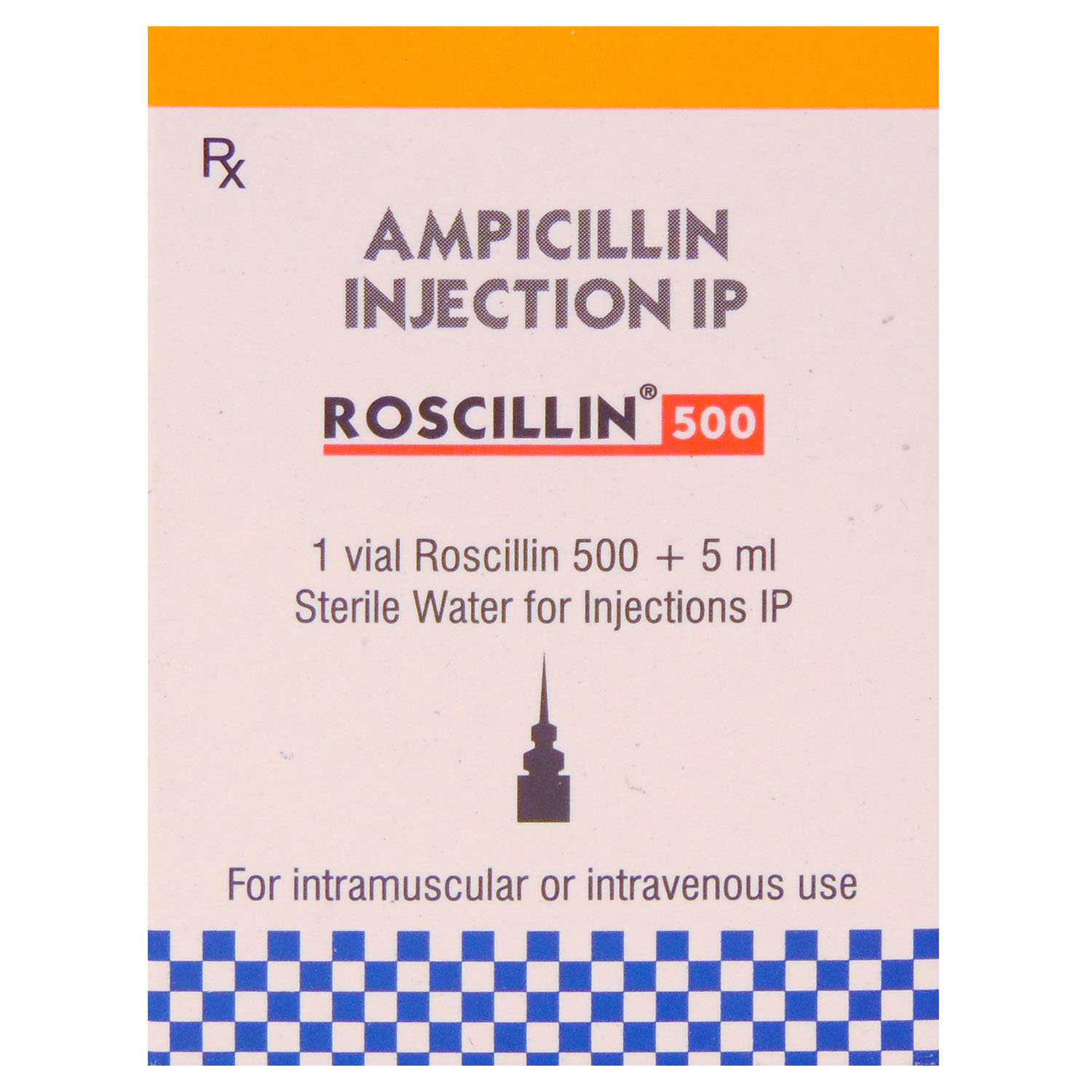- Home
- Synthocilin 500mg Injection
Synthocilin 500mg Injection Substitute
Synthocilin 500mg Injection Substitute
Medicine Composition:
AMPICILLIN-500MGAll Substitutes & Brand Comparisons
RX
Out of StockAfdillin 500mg Injection
Anglo French Drugs & Industries Ltd
₹8.25
(₹1.48/ 1ml)
71% CHEAPERRX
Out of StockAmpicad 500mg Injection
Zydus Cadila
₹7.18
(₹2.15/ 1ml)
57% CHEAPERRX
Out of StockBACIPEN 500MG INJECTION 5ML
Alembic Pharmaceuticals Ltd
₹14.5
(₹2.62/ 1ml)
48% CHEAPERRX
Out of StockLupillin 500mg Injection
Lupin Ltd
₹7.5
(₹3.38/ 1ml)
33% CHEAPERRX
Out of StockAmpijet 500mg Injection
Pharmed Ltd
₹4.24
(₹3.82 per unit)
25% CHEAPERRX
Out of StockLabcillin 500mg Injection
Laborate Pharmaceuticals India Ltd
₹7.12
(₹6.41 per unit)
25% COSTLIERRX
Out of StockLabicillin 500mg Injection
Laborate Pharmaceuticals India Ltd
₹7.25
(₹6.52 per unit)
27% COSTLIERRX
Out of StockBinoclox 500mg Injection
Concept Pharmaceuticals Ltd
₹7.5
(₹6.75 per unit)
32% COSTLIERRX
ROSCILLIN 500MG INJECTION
₹15
(₹13.5 per unit)
164% COSTLIERRX
BROADICILLIN 500MG INJECTION
Alkem Laboratories Ltd
₹15
(₹13.5 per unit)
164% COSTLIERRX
ARISTOCILLIN 500MG INJECTION
Aristo Pharmaceuticals Pvt Ltd
₹15
(₹13.5 per unit)
164% COSTLIERRX
Campicillin 500 mg Injection 1's
Cadila Pharmaceuticals Ltd
₹15
(₹13.5 per unit)
164% COSTLIERRX
Out of StockCincillin 500mg Injection
Ind Swift Laboratories Ltd
₹15
(₹13.5 per unit)
164% COSTLIERRX
Out of StockGercillin 500 Injection 1's
Zydus Cadila
₹16
(₹14.4 per unit)
181% COSTLIERRX
Out of StockAMPIPEN 500MG INJECTION
Morepen Laboratories Ltd
₹53.53
(₹48.18 per unit)
842% COSTLIER

When Should You Consider Switching from Synthocilin 500mg Injection?
Patients may explore substitutes in the following scenarios:
- High monthly cost of Synthocilin 500mg Injection
- Non-availability in local pharmacies
- Generic recommendation by a doctor
- Side effects or better tolerability with alternatives
What to Know Before Switching
Before you switch from Synthocilin 500mg Injection to another medicine, here are some important points to keep in mind:
Same salt, different brands:
Most substitutes contain the same active ingredient - AMPICILLIN-500MG, but the fillers, coating, or manufacturing quality may vary slightly.
Consult your doctor first:
Even if the salt is the same, your doctor can confirm if the substitute is right for your condition, dosage, and health history.
Watch out for allergies or reactions:
Some people may react differently to certain brands due to inactive ingredients. If you notice any side effects, inform your doctor immediately.
Price ≠ effectiveness:
A lower-priced substitute doesn't mean it's less effective. Many generic medicines work just as well as branded ones.
Check the dosage form and strength:
Always match the substitute’s strength (e.g., 5mg, 10mg) and form (tablet, capsule, syrup) with what your doctor prescribed.
Uses
Medicinal Benefits
Synthocilin 500mg Injection is a broad-spectrum penicillin antibiotic that is effective against a wide range of bacterial infections. You can get sick and have your body quickly reproduce with harmful or contagious bacteria. Synthocilin 500mg Injection primarily eliminates bacteria and stops the spread of bacterial infection. Meningitis, kidney infections, gonorrhoea, pneumonia, and infections of the intestines or stomach are all bacterial infections treated with it.
FAQs
The substitutes of Synthocilin 500mg Injection contain the same active salt(s) - AMPICILLIN-500MG. However, they may differ in price, manufacturing quality, and inactive ingredients. Speak to your doctor to find a suitable option.
Switching to a generic substitute medicine in the place of Synthocilin 500mg Injection is often possible if it has the same salt, strength, and dosage form. But always check with your doctor before making any changes to your medication.
Generics versions of Synthocilin 500mg Injection are typically more affordable because they don’t include the original brand's research, development, and marketing costs. They contain the same active ingredient and are approved for safety and effectiveness.
Most people don’t notice any difference. However, some may react to different fillers or coatings. If you notice any unusual symptoms after switching, consult your doctor.
Make sure the new medicine has the same active salt, strength, dosage form. Always confirm the change with your doctor or pharmacist.
Substitutes of Synthocilin 500mg Injection meet the same safety and efficacy standards as Synthocilin 500mg Injection, but small differences in absorption or formulation can exist. A doctor can help you choose the right one for your needs.
Yes. Substitutes of Synthocilin 500mg Injection may vary in color, size, or shape due to differences in manufacturing and branding, but this does not affect how they work.
Yes, it’s generally safe to switch between multiple substitutes of Synthocilin 500mg Injection if they have the same salt and strength. However, always inform your doctor so they can monitor how your body responds.
Yes, many people safely use substitutes of Synthocilin 500mg Injection for long-term treatment. Just ensure it’s done under medical supervision.
If your symptoms stay under control or lab results remain stable, the substitute for Synthocilin 500mg Injection is likely working well. Regular follow-ups with your doctor are important.
Absolutely. Even with the same salt, small differences can affect how your body responds when switching from Synthocilin 500mg Injection to its substitute. Always consult your doctor before switching.





